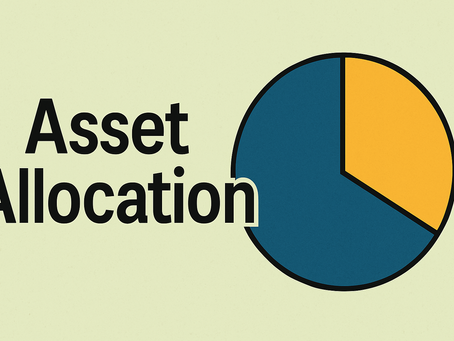top of page



Financial Word of the Day: Core-Satellite Portfolio
If you’ve ever felt torn between “playing it safe” and “trying to grow faster,” the Core-Satellite Portfolio might be exactly what you’re looking for. It’s a smart, flexible investing framework that blends stability with opportunity—without turning your portfolio into a full-time hobby.
What Is a Core-Satellite Portfolio?
A Core-Satellite Portfolio is an investment strategy that divides your portfolio into two main parts...

Larry Jones


Financial Word of the Day: Strategic Asset Allocation
If you’ve ever felt like investing advice changes with every headline, Strategic Asset Allocation is the calming counterweight.
Strategic Asset Allocation is the long-term framework for how your money is divided among major asset classes—typically stocks, bonds, cash, and sometimes real estate or alternatives—based on your goals, time horizon, and risk tolerance. It’s the “set the course and stick to it” approach to investing.

Larry Jones


Financial Word of the Day: Tactical Asset Allocation
Tactical Asset Allocation is a fancy-sounding term for something pretty practical: temporarily adjusting how your money is invested based on current market conditions.
Think of it as steering the ship—not rebuilding it.
The Simple Definition of Tactical Asset Allocation
Tactical Asset Allocation (TAA) is an investment strategy where you make short-term adjustments to your portfolio’s asset mix (stocks, bonds, cash, real estate, etc.) to take advantage of market opportuniti

Larry Jones


Financial Word of the Day: Momentum Strategy
Momentum Strategy is a simple but powerful investing concept built on one core idea:assets that have been performing well tend to keep performing well—at least for a period of time.
Instead of trying to predict what might do well next, a momentum strategy focuses on what’s already working and rides that trend until the momentum fades.
This approach isn’t flashy. It’s disciplined. And when used wisely, it can help investors avoid emotional decision-making and align their mon

Larry Jones


Financial Word of the Day: Contrarian Strategy
Definition of Contrarian Strategy
A Contrarian Strategy is an approach to investing (and decision-making) where you intentionally go against the prevailing market sentiment. When most people are optimistic and buying aggressively, contrarians get cautious. When most people are fearful and selling, contrarians start looking for opportunities.
At its core, a contrarian strategy assumes that markets often overreact—both on the upside and the downside...

Larry Jones


Financial Word of the Day: Seasonal Investing
A Simple Definition of Seasonal Investing
Seasonal Investing refers to investing strategies that take advantage of recurring calendar-based trends in the financial markets.
These trends can be monthly, quarterly, or tied to specific parts of the year — like holidays, earnings seasons, or even weather patterns.
A classic example is the saying, “Sell in May and go away,” which reflects the historical tendency for stocks to underperform during the summer months...

Larry Jones


Financial Word of the Day: Sector Rotation
Definition of Sector Rotation
Sector Rotation is an investment strategy that involves shifting money between different sectors of the economy—such as technology, healthcare, energy, or consumer goods—based on where we are in the economic or market cycle. The idea is simple: different sectors tend to perform better at different times.
In other words, not all parts of the market lead at the same time. Smart investors pay attention to where the momentum is moving next...

Larry Jones


Financial Word of the Day: Relative Strength
Definition of Relative Strength
Relative Strength is a way to compare the performance of one investment to another—most commonly against the overall market or a benchmark like the S&P 500. Instead of asking, “Is this investment going up?” relative strength asks the better question: “Is this investment performing better or worse than something else?”
That subtle shift matters more than most people realize.
An investment can be rising in price and still be a poor performer..

Larry Jones


Financial Word of the Day: Momentum
Definition of Momentum
In finance and investing, momentum refers to the tendency of an asset’s price, earnings, or financial performance to continue moving in the same direction for a period of time. Simply put: what’s been working lately often keeps working—at least for a while.
Momentum is rooted in human behavior. Investors don’t change their minds overnight. Confidence builds gradually...

Larry Jones


Financial Word of the Day: Mean Reversion
The Definition of Mean Reversion
Mean Reversion is the concept that over time, prices, returns, or performance tend to move back toward their long-term average—or “mean.”
In plain English: What goes up too far usually comes back down.What goes down too far often comes back up.
Markets don’t move in straight lines forever. They swing. They overshoot. Then they correct.

Larry Jones


Financial Word of the Day: Window Dressing
What Is Window Dressing?
Window dressing is the practice of making financial statements, investment portfolios, or business results look better than they really are—usually right before they’re reviewed by outsiders.
It’s not always illegal. But it’s often misleading.

Larry Jones


Financial Word of the Day: Santa Claus Rally
What Is a Santa Claus Rally?
A Santa Claus Rally refers to the historical tendency for the stock market to rise during the final trading days of December and the first couple of trading days in January. Traditionally, this period includes the last five trading days of the year and the first two trading days of the new year.
In plain English: stocks often get a late-December boost—right when people are hanging lights, wrapping gifts, and eating one too many cookies.

Larry Jones


Financial Word of the Day: Halloween Effect
Definition of Halloween Effect
The Halloween Effect (sometimes called Sell in May and Go Away) is a market anomaly that suggests stocks tend to perform better during the six-month period from November through April than they do from May through October.
In plain English: historically speaking, the market has often delivered stronger returns in the “winter” months than in the “summer” months.

Larry Jones


Financial Word of the Day: January Effect
Definition of January Effect
The January Effect is a market pattern where stocks—especially small-cap stocks—tend to perform better in January than in other months. The theory suggests that prices rise early in the year after investors rebalance portfolios, reinvest bonuses, or buy back stocks they sold in December.
In plain English: January often gets a little more bullish than average.

Larry Jones


Financial Word of the Day: Market Anomaly
Definition of Market Anomaly
A market anomaly is a pattern, trend, or result in financial markets that doesn’t line up with what traditional financial theory says should happen. In plain English: it’s when the market behaves in a way that looks weird, inconsistent, or flat-out illogical—yet happens often enough that investors notice.
Classic finance theory assumes markets are efficient, rational, and price assets perfectly based on available information...

Larry Jones


Financial Word of the Day: Bounded Rationality
What Is Bounded Rationality?
Bounded rationality is the idea that people make decisions using limited information, limited time, and limited mental energy. Instead of finding the best possible decision, we settle for a decision that is “good enough.”
The term was popularized by economist Herbert Simon, and it explains why real-world financial decisions often look messy, emotional, and inconsistent—because they are.
In short: We don’t optimize. We simplify.

Larry Jones


Financial Word of the Day: Hot Hand Fallacy
Definition of Hot Hand Fallacy
The Hot Hand Fallacy is the belief that because someone has experienced success repeatedly in the recent past, they are more likely to continue succeeding in the future—even when outcomes are largely driven by chance.
In simple terms: “They’re on a roll, so they can’t miss.”In finance, that mindset can quietly drain your wallet.

Larry Jones


Financial Word of the Day: Gambler's Fallacy
Definition of Gambler's Fallacy
Gambler’s Fallacy is the mistaken belief that past random events influence future outcomes—even when each event is independent. In plain English: just because something has happened a lot lately doesn’t mean it’s “due” to change.
This thinking shows up most famously in casinos, but it quietly sneaks into everyday financial decisions far more often than people realize.

Larry Jones


Financial Word of the Day: Sunk Cost Fallacy
Definition of Sunk Cost Fallacy
The sunk cost fallacy is the tendency to continue investing time, money, or effort into something simply because you’ve already invested in it—even when walking away would be the smarter financial decision. A “sunk cost” is a cost that’s already been paid and cannot be recovered. The fallacy happens when past costs influence future decisions.
In plain English: “I’ve already spent so much, I can’t quit now.”

Larry Jones


Financial Word of the Day: Endowment Effect
What Is the Endowment Effect?
The Endowment Effect is a behavioral finance bias where people place a higher value on something simply because they own it.
In plain English: Ownership makes us emotionally attached, and that attachment inflates value in our minds.
Once something becomes “mine,” logic quietly leaves the room and emotion takes the driver’s seat.

Larry Jones


Financial Word of the Day: Home Bias
Definition of Home Bias
Home Bias is the tendency for investors to heavily favor investments from their own country while underinvesting in international markets.
In plain English: we like what’s familiar. We buy U.S. stocks, U.S. bonds, U.S. real estate… and quietly ignore the rest of the world—even though the global economy is much bigger than just us.
From a comfort standpoint, that makes sense. From a wealth-building standpoint, it can quietly hold you back.

Larry Jones


Financial Word of the day: Status Quo Bias
A Simple Definition of Status Quo Bias
Status Quo Bias: The tendency to stick with your current financial choices—accounts, habits, subscriptions, investments—even when changing them would clearly benefit you.
It’s not laziness. It’s wiring. Your brain interprets “same” as “safe,” even when “same” is sinking your wallet.

Larry Jones


Financial Word of the Day: Recency Bias
Definition of Recency Bias
Recency Bias is the tendency to give more weight to the most recent information we’ve seen—while ignoring long-term data, history, and trends. In simple terms: what just happened feels more important than what usually happens.
And in money decisions, that can get expensive fast.

Larry Jones


Financial Word of the Day: Representativeness
Definition of Representativeness
Representativeness is a mental shortcut (bias) where we assume something belongs to a certain category because it looks like a typical example—even when the actual data doesn’t support that conclusion.
In plain English: “This reminds me of that… so it must be that.”
Our brains love patterns. The problem? Sometimes we see patterns that aren’t really there—especially with money.

Larry Jones


Financial Word of the Day: Availability Heuristic
Definition of Availability Heuristic
The availability heuristic is a mental shortcut where we judge how likely something is based on how easily examples come to mind—rather than on actual data or probabilities.
In plain English: If you can remember it easily, your brain thinks it happens all the time. And in money decisions, that can get expensive.

Larry Jones


Financial Word of the Day: Mental Accounting
What Mental Accounting Means (in plain English)
Mental accounting is the habit of mentally dividing your money into different “buckets” based on where it came from or what you think it’s “for”—even though every dollar you own is actually just… a dollar.
Your brain does this automatically because it wants the world to feel organized. But here’s the catch: Those mental labels can lead you straight into bad decisions, missed opportunities, and slower wealth-building.

Larry Jones


Financial Word of the Day: Cognitive Dissonance
What Cognitive Dissonance Means
Cognitive Dissonance is the discomfort your brain experiences when you hold two conflicting beliefs at the same time — especially about money.
You know you should budget……but you also want to believe you “deserve” that impulse purchase.
You know your credit card balance is climbing……but you still believe you’re “good with money.”
You know an investment is performing poorly……but you believe selling it would mean admitting you made a mistake.

Larry Jones


Financial Word of the Day: Prospect Theory
What Prospect Theory Means (Plain English Version)
Prospect Theory explains why people make decisions based on how choices are framed—especially when facing gains and losses. In short:
- We hate losing more than we like winning.
- We’re risk-averse with gains but weirdly risk-seeking with losses.
- Our emotions often override the math.

Larry Jones


Financial Word of the Day: Framing
Definition of Framing
Framing is the way information is presented in order to influence how we perceive value and make financial decisions. The facts don’t change—only how those facts are described. But our brain reacts differently depending on the “frame.”

Larry Jones


Financial Word of the Day: Confirmation Bias
Definition of Confirmation Bias
Confirmation bias is our natural tendency to search for, believe, and remember information that supports what we already think is true—while ignoring anything that challenges our opinion. When it shows up in money decisions, it can push us into bad investments, risky purchases, or just plain stubborn financial mistakes because we convince ourselves we’re already right.

Larry Jones


Financial Word of the Day: Anchoring
A Simple Definition of Anchoring
A behavioral bias where we fixate on an initial price, value, or piece of information and use it to make ongoing decisions—often leading to bad financial choices.

Larry Jones


Financial Word of the Day: Overconfidence
Definition of Overconfidence
Overconfidence (in finance) is a behavioral bias where investors believe they have better knowledge, sharper instincts, or more accurate predictions than they actually do. This confidence leads them to take bigger risks, ignore danger signs, and make decisions based on gut feelings instead of solid strategy.

Larry Jones


Financial Word of the Day: Herding
Definition of Herding
Herding is when investors blindly follow what everyone else is doing instead of making decisions based on actual research, fundamentals, or strategy. It’s jumping into the market simply because “everybody’s buying” or dumping your investments just because “everyone is selling.”

Larry Jones


Financial Word of the Day: Loss Aversion
Definition of Loss Aversion
Loss aversion describes our natural tendency to hate losing money more than we enjoy gaining money. In fact, most people feel the pain of a loss about twice as strongly as the joy of a gain. That emotional imbalance leads many folks to make defensive, fearful, or flat-out irrational money decisions.

Larry Jones


Financial Word of the Day: Behavioral Finance
Definition of Behavioral Finance
Behavioral finance is the study of how our emotions, habits, and quirks influence our financial decisions. In a perfect world, people would invest, save, and spend based on facts and logic. But we don’t—we’re human. We tend to follow the crowd, panic when markets dip, overspend when we’re stressed, and cling to bad investments because we “feel” they’ll bounce back.

Larry Jones


Financial Word of the Day: Random Walk Theory
Definition of Random Walk Theory
Random Walk Theory says that stock prices move in random, unpredictable ways because all available information is already baked into the price. In other words, the market doesn’t care about your predictions, your gut feelings, or your uncle Joe’s “can’t-miss stock tips.” Prices just… wander.

Larry Jones


Financial Word of the Day: Efficient Market Hypothesis
Definition of Efficient Market Hypothesis (EMH)
The Efficient Market Hypothesis (EMH) says this: All publicly available information is already baked into current stock prices — instantly.
In other words, you can’t consistently “out-smart” the market by finding hidden gems, secret tips, or under-the-radar opportunities… because the market has already priced those in. Like, immediately.
According to EMH, the only way to beat the market is by taking more risk — not by being s

Larry Jones


Financial Word of the Day: Modern Portfolio Theory
Definition of Modern Portfolio Theory (MPT)
Modern Portfolio Theory is the idea that you can improve your investment results not by picking perfect individual stocks, but by building a blend of different investments that work well together.
The goal? Maximize your return while minimizing your risk.
In other words: Don’t bet the farm on one horse. Build a team where each player brings something different to the field.

Larry Jones


Financial Word of the Day: Asset Allocation
What Is Asset Allocation?
Asset allocation is the strategy of dividing your investments across different “buckets” — typically stocks, bonds, and cash — based on your goals, your time horizon, and how much risk you can stomach without losing sleep or stress-eating Chips Ahoy at midnight.
Think of it like building a balanced meal.
Stocks = protein
Bonds = veggies
Cash = carbs

Larry Jones


Financial Word of the Day: Rebalancing
What Is Rebalancing?
Rebalancing is the periodic process of adjusting your investment portfolio back to its original target mix. In plain English: the market shifts, your allocations drift, and you move things around to get everything back where it’s supposed to be.
If your plan says 70% stocks and 30% bonds, but stocks had a monster year and now you’re sitting at 82/18, rebalancing is the reset button.

Larry Jones


Financial Word of the Day: Dollar Cost Averaging (DCA)
Definition of Dollar Cost Averaging
Dollar Cost Averaging (DCA) is an investing strategy where you invest a fixed amount of money at regular intervals—say, every week or every month—regardless of whether the market is up or down. Over time, this approach smooths out your purchase price and reduces the risk of buying everything at the market’s peak.

Larry Jones


Financial Word of the Day: Buy and Hold
Definition of Buy and Hold
Buy and Hold is a long-term investment strategy where an investor purchases assets—typically stocks, ETFs, or index funds—and holds them for an extended period, regardless of market fluctuations. The idea is simple: time in the market beats timing the market. Instead of jumping in and out based on daily trends or short-term news, the buy-and-hold investor focuses on the long-term growth of their investments.

Larry Jones


Financial Word of the Day: Momentum Investing
Definition of Momentum Investing
Momentum investing is an investment strategy where investors buy assets that have shown strong recent performance and sell those that have shown weak performance. It’s based on the idea that rising stocks often keep rising for a time, and falling stocks often keep falling, because of market psychology and herd behavior.

Larry Jones


Financial Word of the Day: Income Investing
Definition of Income Investing
Income investing is a strategy focused on generating steady, reliable income from your investments—usually through dividends, interest, or rental income. Instead of betting on stock prices shooting up over time, income investors look for assets that pay them regularly.
The goal? To build a portfolio that produces consistent cash flow without needing to sell assets to make money.

Larry Jones


Financial Word of the Day: Growth Investing
Definition of Growth Investing
Growth investing is a strategy focused on buying shares of companies that are expected to grow faster than the overall market. These companies typically reinvest their profits back into expansion—through new products, technology, or market share—rather than paying dividends to shareholders. The goal? Long-term capital appreciation.

Larry Jones


Financial Word of the Day: Value Investing
Definition of Value Investing
Value investing is a long-term investment strategy focused on buying stocks (or other assets) that appear to be undervalued by the market. In plain English, it means finding strong companies selling for less than they’re truly worth—and holding them until their true value is recognized.

Larry Jones


Financial Word of the Day: Contrarian Investing
Definition of Contrarian Investing
Contrarian Investing is a strategy where investors go against the prevailing market trends—buying when others are selling and selling when others are buying. The idea is simple but gutsy: when the crowd runs in one direction, look carefully at the opportunities they’re leaving behind. Contrarians believe markets often overreact to news, creating mispriced assets that can offer outsized returns once emotions settle.

Larry Jones


Financial Word of the Day: Trend Trading
Definition of Trend Trading
Trend trading is an investing strategy that aims to profit by identifying and following the direction of a market trend — whether that trend is moving up or down. The basic idea: the market tends to move in trends, not random zigzags. Traders use price charts and technical indicators to figure out which direction the trend is heading and then ride that momentum until the trend starts to lose steam.

Larry Jones


Financial Word of the Day: Position Trading
Definition of Position Trading
Position trading is a long-term investing strategy where traders hold assets—like stocks, ETFs, or commodities—for weeks, months, or even years. Instead of reacting to daily price swings, position traders focus on the big picture—economic trends, market cycles, and company fundamentals. They’re not trying to “time” the market day by day—they’re aiming to catch major price movements over time.

Larry Jones


Financial Word of the Day: Swing Trading
Definition of Swing Trading
Swing trading is a short- to medium-term trading strategy that aims to capture “swings” in a stock, ETF, or crypto asset’s price over a few days to several weeks. Unlike day traders who enter and exit within a single day, swing traders hold positions longer to ride momentum—buying when prices are poised to rise and selling when the trend starts to slow or reverse.
The goal is simple: capitalize on market waves without being glued to a screen all

Larry Jones
bottom of page